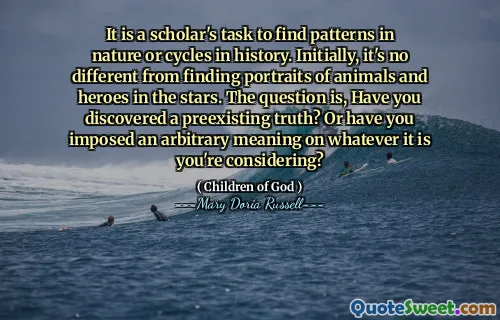
It is a scholar's task to find patterns in nature or cycles in history. Initially, it's no different from finding portraits of animals and heroes in the stars. The question is, Have you discovered a preexisting truth? Or have you imposed an arbitrary meaning on whatever it is you're considering?
This quote highlights the fundamental challenge and responsibility of scholars: to seek genuine understanding rather than superficial or misleading interpretations. It emphasizes the importance of discerning whether our insights are rooted in objective truth or are the product of our own cognitive biases and subjective frameworks. When observing patterns in nature or history, it's easy to fall into the trap of seeing what we want to see—imposing meaning where none exists or forcing data into preconceived notions. The analogy of finding portraits of animals or heroes in the stars evokes the human tendency to seek stories and symbols in the universe, often projecting our own mythology and beliefs onto the cosmos. Yet, the true task is to question the origins of our interpretations. Are they uncovering inherent truths crafted by the universe or history, or are they constructs shaped by our desires and cultural narratives? This reflection encourages a mindful approach to scholarship: one that constantly questions the lens through which we observe and analyze. It reminds us that discovery involves humility and skepticism, recognizing the limits of our perceptions and the necessity of validating findings against nature's or history's intrinsic realities. Ultimately, authentic scholarship in any field demands an awareness of these pitfalls, striving to uncover truths rather than fabrications, and acknowledging the fine line between insight and illusion.







